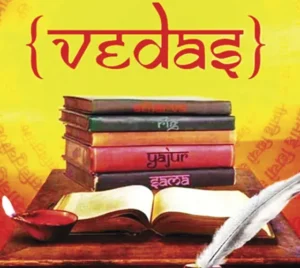The Vedas and Their Beginning: A Journey into Ancient Wisdom

The Vedas, a vast and profound body of knowledge, form the cornerstone of ancient Indian philosophy, religion, and culture. They represent some of the oldest texts in human history, and their influence on various aspects of life, both in ancient times and today, is immeasurable.
The term Veda comes from the Sanskrit root “Vid,” which means “to know” or “knowledge.” As such, the Vedas are considered to be divinely inspired knowledge, imparted by the gods to the ancient sages, who then passed this knowledge down through oral traditions. This sacred wisdom continues to guide millions, particularly in the Hindu, Sikh, and other Indian spiritual traditions.
The origins of the Vedas are intricately tied to the beginning of human civilization on the Indian subcontinent. To fully understand the Vedas, one must delve into their origins, content, structure, and significance in the context of human history.
The Birth of the Vedas: Historical and Contextual Origins
The Vedic period is generally considered to have spanned from around 1500 BCE to 500 BCE, though the texts themselves were transmitted orally long before being committed to writing. The Vedas were composed in a highly sophisticated form of early Indo-Aryan language, a precursor to the Sanskrit language. Their creation is often associated with the Indo-Aryan migration into the Indian subcontinent, which is thought to have occurred around 1500 BCE.
The Indo-Aryans, who likely migrated from Central Asia, brought with them a rich oral tradition that included hymns, rituals, and chants aimed at appeasing the gods. The religious and philosophical ideas that emerged from this period became the foundation for the Vedic texts. It is important to note that the Vedas themselves were not written by a single individual or group, but rather, they evolved over centuries, with contributions from numerous seers, sages, and priests.
The Structure of the Vedas
There are four main Vedas, each consisting of a vast collection of hymns, prayers, philosophical discussions, and rituals:
1. Rigveda: The oldest and most important Veda, the Rigveda consists of hymns dedicated to various deities and forces of nature. It is a collection of over 1,000 hymns, composed by different rishis (sages) over centuries. The Rigveda is primarily concerned with the elements of nature, such as fire (Agni), the sun (Surya), the sky (Varuna), and the earth (Prithvi), and is considered the foundational text of Vedic literature.
2. Yajurveda: The Yajurveda is focused on the performance of rituals and sacrifices. It contains hymns and mantras to be recited by priests during the ritual acts. The Yajurveda is divided into two branches: the Shukla Yajurveda (white) and the Krishna Yajurveda (black), differing in the way the hymns and prayers are structured.
3. Samaveda: The Samaveda is largely a compilation of melodies and chants. It consists mainly of hymns that are to be sung during sacrifices, especially during the Soma ritual. The Samaveda’s focus on musicality and sound reflects its importance in creating an atmosphere conducive to spiritual elevation.
4. Atharvaveda: The Atharvaveda, unlike the other three Vedas, includes hymns and incantations that deal with everyday life, health, and magic. It covers a wide range of topics, from prayers for protection to healing rituals, and even spells to ward off evil forces.
Each of the Vedas is composed of four parts, reflecting the diverse aspects of Vedic knowledge:
1. Samhitas: Collections of hymns and mantras used in rituals.
2. Brahmanas: Texts that explain the rituals, ceremonies, and the meanings of the hymns.
3. Aranyakas: Texts that serve as a bridge between ritual and philosophical thought, often associated with ascetic life and meditation.
4. Upanishads: Philosophical texts that explore the deeper meanings and spiritual teachings behind the rituals and hymns.
The Role of Oral Tradition in the Transmission of the Vedas
The Vedas were passed down through oral tradition, which is one of the most striking features of these texts. In ancient India, the art of memorization was highly refined. The Vedas were not merely recited; they were chanted with precision and accuracy, using specific tones and rhythms, to preserve both their meaning and their sound. The recitation was carried out by trained priests called Pandits or Brahmins, who had devoted their lives to learning the sacred texts.
This oral tradition ensured that the Vedas were preserved in their original form for millennia. The accuracy of transmission was a matter of great importance, and immense effort was dedicated to memorizing and reciting the texts without any deviation. Special mnemonic techniques were employed to retain the hymns and mantras in their entirety.
The Vedic chant itself is thought to have a specific spiritual power. According to Vedic belief, the sound vibrations of the recited hymns could influence the forces of nature and communicating directly with the divine. The use of precise intonation, rhythm, and sound was considered vital to ensure the efficacy of rituals and to invoke the gods’ blessings.
The Significance of the Vedas in Ancient Indian Culture
The Vedas are not merely religious texts; they represent the cultural and philosophical foundation of ancient India. The Vedic worldview was deeply interconnected with the natural world, and the Vedas taught that the forces of nature, such as the sun, fire, water, and wind, were divine manifestations. These forces were revered and propitiated through elaborate rituals to ensure the well-being of the community.
The Vedic society was structured around the varna system, which later evolved into the caste system. The Brahmins (priests), Kshatriyas (warriors), Vaishyas (merchants), and Shudras (labourers) were the four primary groups, each playing a distinct role in the maintenance of social and religious order. The Vedic texts themselves, particularly the Brahmanas, prescribe the roles and duties of each varna in society.
The Vedas also emphasized the importance of dharma (righteousness), karma (action), and moksha (liberation). These key concepts form the ethical and spiritual framework that would later evolve into the core tenets of Hindu philosophy.
The Philosophical Teachings of the Vedas
While the Vedas are primarily religious and ritualistic in nature, they also contain profound philosophical insights. Over time, as the Vedic society became more introspective, the Upanishads—found in the final section of the Vedas—began to emerge. These texts introduced profound metaphysical concepts that would influence the course of Indian thought for centuries to come. Key teachings from the Vedas and the Upanishads include:
• Brahman: The ultimate, unchanging reality or cosmic principle that pervades the universe.
• Atman: The individual soul, which is seen as a part of the larger Brahman.
• Tat Tvam Asi (You are That): A famous Upanishadic declaration that emphasizes the oneness of the individual soul with the ultimate reality.
• Maya: The illusion or veil that obscures the true nature of reality.
• Reincarnation and Karma: The belief that the soul is reborn, and one’s actions in life determine their future existence.
The teachings of the Vedas, particularly through the Upanishads, laid the groundwork for the development of Vedanta, one of the six orthodox schools of Hindu philosophy. Vedanta focuses on the nature of reality, the self, and the ultimate purpose of life—liberation from the cycle of birth and rebirth (samsara).
The Enduring Legacy of the Vedas
The Vedas continue to be revered as the ultimate source of knowledge and spiritual wisdom in Hinduism. They have profoundly influenced Indian philosophy, spirituality, and religion and have shaped the cultural identity of India for millennia. The reverence for the Vedas is not limited to just the rituals and religious practices; they also form the basis of much of the philosophical discourse in India, shaping debates on metaphysics, ethics, and the nature of existence.
Over time, the influence of the Vedas extended beyond India, reaching other parts of the world through the spread of Indo-European languages and cultural exchange. The core teachings of the Vedas, particularly those found in the Upanishads, have also had a significant impact on world philosophy, influencing figures such as Schopenhauer, Einstein, and Carl Jung, among others.
In modern times, the Vedas continue to be studied and interpreted by scholars, spiritual seekers, and practitioners alike. Their deep insights into the nature of the self, the cosmos, and the divine provide a timeless source of inspiration for those seeking answers to the fundamental questions of life.
Conclusion
The Vedas are much more than ancient texts; they represent a comprehensive worldview that encompasses ritual, philosophy, science, ethics, and spirituality. Their origins lie in the early migrations of Indo-Aryan peoples into the Indian subcontinent, and their preservation and transmission through the oral tradition make them unique in human history. Despite their age, the Vedas continue to be a source of profound wisdom and influence, shaping not only Indian culture but also the wider spiritual and philosophical landscape of the world.
The journey of the Vedas, from their oral transmission to their written form, and their enduring relevance, underscores the timeless human quest for understanding the nature of existence and the divine.

